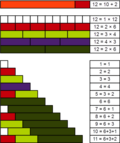In number theory, a colossally abundant number (sometimes abbreviated as CA) is a natural number that, in a particular, rigorous sense, has many divisors...
11 KB (1,635 words) - 02:04, 30 March 2024
the natural number following 11 and preceding 13. Twelve is the 3rd superior highly composite number, the 3rd colossally abundant number, the 5th highly...
26 KB (2,596 words) - 06:53, 2 July 2025
number, the 19th highly composite number, an abundant number, the 8th colossally abundant number and the number of permutations of 4 items out of 10 choices...
5 KB (597 words) - 00:43, 14 June 2025
1,000,000 (redirect from 1,000,000 (number))
divisor number 1,441,440 = 11th colossally abundant number, 11th superior highly composite number, 40th highly composite number 1,441,889 = Markov number 1...
29 KB (3,857 words) - 06:46, 1 July 2025
In number theory, a highly abundant number is a natural number with the property that the sum of its divisors (including itself) is greater than the sum...
5 KB (516 words) - 04:30, 25 September 2023
100,000,000 (redirect from 111111111 (number))
number 225,331,713 = self-descriptive number in base 9 229,345,007 = 475 232,792,560 = superior highly composite number; colossally abundant number;...
19 KB (2,362 words) - 14:13, 4 July 2025
100,000 (redirect from 100,000 (number))
10th superior highly composite number; 10th colossally abundant number; 38th highly composite number, smallest number divisible by the numbers from 1...
29 KB (3,836 words) - 09:55, 6 July 2025
highly composite number, the 4th colossally abundant number, the 9th highly composite number, a unitary perfect number, and an abundant number. It is the smallest...
7 KB (760 words) - 06:16, 5 June 2025
primitive abundant number is an abundant number whose proper divisors are all deficient numbers. For example, 20 is a primitive abundant number because:...
2 KB (286 words) - 01:51, 8 May 2025
10, and 12; colossally abundant number; Harshad number in several bases. It is also the highest number with more divisors than any number less than double...
34 KB (4,986 words) - 21:05, 6 July 2025
5th colossally abundant number. It is also a sparsely totient number. 120 is also the smallest highly composite number with no adjacent prime number, being...
6 KB (756 words) - 14:38, 1 June 2025
In number theory, an abundant number or excessive number is a positive integer for which the sum of its proper divisors is greater than the number. The...
8 KB (1,067 words) - 20:04, 19 June 2025
50,000 (redirect from 55440 (number))
= 3-smooth number 55440 = the 9th superior highly composite number; the 9th colossally abundant number, the 28th highly composite number. 55459 = one...
6 KB (543 words) - 13:08, 7 July 2025
superior highly composite number. the 7th colossally abundant number. the 18th highly composite number. the last highly composite number that is half of the...
2 KB (307 words) - 02:01, 1 January 2025
1,000,000,000 (redirect from 1,000,000,000 (number))
= 15th colossally abundant number, 15th superior highly composite number, and the largest number to be both. 7,007,009,909 = smallest number in base...
31 KB (3,779 words) - 13:33, 6 July 2025
10,000,000 (redirect from 12988816 (number))
531,778 = Markov number 21,621,600 = 13th colossally abundant number, 13th superior highly composite number 22,222,222 = repdigit 22,235,661 = 33×77 22...
19 KB (2,428 words) - 08:16, 3 July 2025
superior highly composite number, the 6th colossally abundant number, a refactorable number, a 5-smooth number, and a Harshad number in decimal since the sum...
6 KB (853 words) - 12:37, 15 May 2025
The first 15 superabundant numbers are the same as the first 15 colossally abundant numbers. In decimal, 15 contains the digits 1 and 5 and is the result...
8 KB (1,071 words) - 04:19, 4 May 2025
perfect number. Most abundant numbers are also semiperfect; abundant numbers which are not semiperfect are called weird numbers. Hyperperfect number Multiply...
38 KB (5,172 words) - 17:00, 3 June 2025
Fibonacci sequence (redirect from Fibonacci number)
month, the number of pairs of rabbits is equal to the number of mature pairs (that is, the number of pairs in month n – 2) plus the number of pairs alive...
86 KB (13,080 words) - 14:15, 7 July 2025
A composite number is a positive integer that can be formed by multiplying two smaller positive integers. Accordingly it is a positive integer that has...
6 KB (851 words) - 18:31, 9 July 2025
also the first 15 colossally abundant numbers, which meet a similar condition based on the sum-of-divisors function rather than the number of divisors. Neither...
8 KB (1,009 words) - 09:08, 3 May 2025
In mathematics, a double Mersenne number is a Mersenne number of the form M M p = 2 2 p − 1 − 1 {\displaystyle M_{M_{p}}=2^{2^{p}-1}-1} where p is prime...
10 KB (1,021 words) - 12:46, 16 June 2025
In number theory, an n-smooth (or n-friable) number is an integer whose prime factors are all less than or equal to n. For example, a 7-smooth number is...
12 KB (1,579 words) - 12:30, 4 June 2025
In number theory, a practical number or panarithmic number is a positive integer n {\displaystyle n} such that all smaller positive integers can be represented...
27 KB (4,246 words) - 03:55, 10 March 2025
semiperfect number is 945. A semiperfect number is necessarily either perfect or abundant. An abundant number that is not semiperfect is called a weird number. With...
5 KB (441 words) - 01:39, 7 July 2025
A prime number (or a prime) is a natural number greater than 1 that is not a product of two smaller natural numbers. A natural number greater than 1 that...
117 KB (14,179 words) - 23:31, 23 June 2025












